| All Artists: Otto Klemperer, Aase Nordmo-Lovberg, Christa Ludwig, Waldemar Kmennt, Hans Hotter, Philharmonia Chorus, Philharmonia Orchestra Title: Klemperer Legacy - Beethoven: Symphony no. 9, Prometheus Overture / Ludwig, Hotter, Philharmonia Chorus & Orchestra, et al Members Wishing: 0 Total Copies: 0 Label: Angel Records Original Release Date: 1/1/1957 Re-Release Date: 11/3/1998 Album Type: Original recording remastered Genre: Classical Styles: Ballets & Dances, Ballets, Historical Periods, Classical (c.1770-1830), Modern, 20th, & 21st Century, Symphonies Number of Discs: 1 SwapaCD Credits: 1 UPC: 724356679726 |
Search - Otto Klemperer, Aase Nordmo-Lovberg, Christa Ludwig :: Klemperer Legacy - Beethoven: Symphony no. 9, Prometheus Overture / Ludwig, Hotter, Philharmonia Chorus & Orchestra, et al
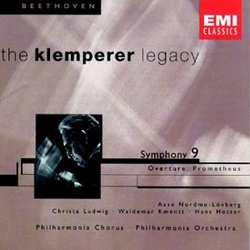 | Otto Klemperer, Aase Nordmo-Lovberg, Christa Ludwig Klemperer Legacy - Beethoven: Symphony no. 9, Prometheus Overture / Ludwig, Hotter, Philharmonia Chorus & Orchestra, et al Genre: Classical
The Philharmonia Orchestra was in superb form in the autumn of 1957 when the opportunity came for it to perform all nine Beethoven symphonies, plus the five piano concertos, in a series of 10 concerts at London's Royal Fes... more » |
Larger Image |
CD DetailsSynopsis
Amazon.com The Philharmonia Orchestra was in superb form in the autumn of 1957 when the opportunity came for it to perform all nine Beethoven symphonies, plus the five piano concertos, in a series of 10 concerts at London's Royal Festival Hall under the baton of Otto Klemperer. Credit for that certainly should go to Herbert von Karajan, who had been the orchestra's principal conductor since its founding a decade earlier, and had recently been tapped by the Berlin Philharmonic as its conductor for life. Karajan had molded the Philharmonia players into a cohesive, responsive, and potently sonorous body, but Klemperer brought something new to the party, a gravitas and bearing that encouraged the orchestra to play with inner warmth and lent tremendous authority to this reading of the Ninth, recorded in Kingsway Hall during the course of the cycle. Klemperer's conception is monumental, but never ponderous or self-consciously weighty: he is, if anything, understated in the climaxes, but the account is nevertheless towering in its cumulative effect. In the symphony's first movement, he observes the tempo marking "Allegro ma non troppo, un poco maestoso" with rare self-control; there is no rush, and the movement takes on a granitic purposefulness as a result. The scherzo is animated without being frenzied, and the adagio is simply beautiful--direct, full of warmth and nobility. With a mostly splendid set of soloists, and a brilliantly prepared chorus, the finale, that splendid hymn to joy, becomes a gesture of real magnificence. Klemperer makes it one sweeping utterance, with none of the choppy, episodic feel one so often finds in it. EMI's recording is beautifully balanced and presents an outstanding stereo image. Klemperer's left-right seating of the violins registers to great effect, and the winds and brass are precisely placed, with every detail in their parts coming through clearly. A triumph, considering the vintage, and beautifully restored in this new 24-bit remastering. --Ted Libbey Similarly Requested CDs
|
CD ReviewsOne of the greatest interpretations - ever! L. Johan Modée | Earth | 03/16/2007 (5 out of 5 stars) "In my view, here we have the greatest Beethoven ninth on record - next to Klemperer's own live version (Testament), made just before the present recording in 1957. Unlike all other conductors, Klemp demands clear articulations from all departments, which results in an outstanding performance. This interpretation moves me like no other. If you haven't heard this ninth or its live counterpart, you haven't heard Beethoven's ninth at its very best. The difference consists partly in the fact that Klemperer lets the trombones and percussion play as they should, according to the score - i.e. clearly audible. Most other conductors tend to ignore this. On the present recording, the result is just amazing. The recording quality is very fine, despite its age. It is far better than many other, later recordings (e.g., Karajan's). Compared with the live version from Testament, which has an identical orchestra, choir and set of soloists, the stereo picture is slightly more balanced, with the timpani somewhat less articulated. (But isn't that how it should sound in a real concert situation? Beethoven demands clearly articulated timpani - thus the Testament disc sound utterly realistic to me.) But the main thing concerns the interpretation, which is same on both recordings. This interpretation is simply the one to have (alternative: the live version on Testament, which adds the special frisson of a live performance). If you look for the ideal Beethoven ninth, this is as close as it ever gets. Grab it now: your're close to the ultimate musical experience in world history. " An historical must-have for devotees of Klemperer Santa Fe Listener | Santa Fe, NM USA | 06/18/2006 (4 out of 5 stars) "Otto Klemperer was so lionized in London when he took over the Philharmonia in the mid-Fifties that it's hard to realize how little his name must mean to younger American listeners. This 1957 Beethoven Ninth was arguably the first famous recording of the work in stereo, bought by nearly every serious music lover and compared endlessly to Toscanini and Furtwangler. Now it's something of a hisotrical document, and appreciating it requires a taste for the Klemperer mystique. He didn't care for beauty of sound or romantic sentiment. His conducting was serious and sober; as the 15-min. Scherzo here demonstrates, his tempos were often quite measured (even when Beethoven marked the tempo as Presto). Textures were at times rough, especially in the choral singing in the finale, and dynamics tended to hover around mezzo forte. Yet despite the lack of finish, Klemperer's performances seemed totally genuine, as if he personally knew Beethoven's vision. That's especially true in the slow movement, which is expressed as if one phrase followed another effortlessly (the flow is helped by Klemperer's tempo, which in this case is 2 min. faster than Karajan's in his 1963 recording from Berlin). I think any listener would be impressed by the strength and power of the first movement, too. There's no attempt att mystery and not much drama in terms of dynamic shading from soft to loud, yet the heroic spirit of the music is captured perfectly. Another highlight is the choral singing from the newly founded Philharmonia Chorus, whose German is excellent, as is their diciton. The highest praise one can give any chorus is that they phrase like one singer, which is true here. Among the soloists Hans Hotter is eloquent and secure in the bass solo, and everyone else is never less than very good--happily, they don't try to outshourt each other when Beethoven gives them overlapping lines. As a side note, a live peformance given at the same time in Royal Festival Hall was taped by EMI engineers but never released. Now it's available on Testament. It's said to be identical in terms of interpretation but with a tauter edge and engineered with prominent winds and timpani. Such is Klemperer's fame as a Beethoven conductor that Testament has yet another live reading from 1961. Competing Amazon reviewers insist that one is far superior than the other, but it costs about $40 to buy both recordings and judge for yourself." Ditto Ted Libbey's Amazon Review King Lemuel | Puyallup, WA | 07/18/2007 (5 out of 5 stars) "I have this on vinyl as well as digital media. It would be just wonderful if even half the classical recordings from 1956, 57 etc sounded as good as this!
Mr. Libbey has done a good job in describing the 4 movements and the superlative aspects of this recording and, as I listened and reflected on his comments, I found myself nodding yes. This is really a beautiful performance, it is measured and not over the top." |

 Track Listings (5) - Disc #1
Track Listings (5) - Disc #1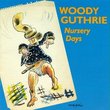
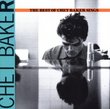
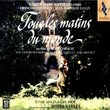
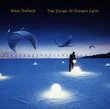

![Seussical [2000 Original Broadway Cast]](https://nationalbookswap.com/cd//m/02/4802/514802.jpg)



